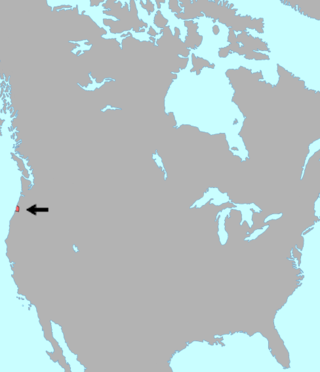| Alsea | |
|---|---|
| Alsea–Yaquina, Yakonan, Alséya | |
| Native to | United States |
| Region | Oregon |
| Ethnicity | Alsea people, Yaquina people |
| Extinct | 1942, with the death of John Albert |
| Language family | Coast Oregon Penutian?
|
| Dialects |
|
| Language codes | |
| ISO 639-3 | aes |
| Linguist List | aes |
| Glottolog | alse1251 |
 Pre-contact distribution of Alsean Pre-contact distribution of Alsean | |
| This article contains IPA phonetic symbols. Without proper rendering support, you may see question marks, boxes, or other symbols instead of Unicode characters. For an introductory guide on IPA symbols, see Help:IPA. | |
Alsea /ˈælsiː/ or Alsean (also Yakonan) was two closely related speech varieties spoken along the central Oregon coast until the early 1950s. They are sometimes taken to be different languages, but it is difficult to be sure given the poor state of attestation; Mithun believes they were probably dialects of a single language.
Classification
Alsea is usually considered to belong to the Penutian phylum, and may form part of a Coast Oregon Penutian subgroup together with Siuslaw and the Coosan languages. Numerous lexical resemblances between Alsea and the Northern Wintuan languages, however, are more likely the result of borrowing about 1,500 years ago when the (Northern) Wintuan speech community appears to have been located in Oregon. Alsea is also considered to be a language isolate.
Varieties
- Alsea
- Alsea (Alséya) †
- Yaquina (Yakwina, Yakona) †
Both are now extinct.
The name Alsea derives from the Coosan name for them, alsí or alsí·, and the Marys River Kalapuyan name for them, alsí·ya. Alsea was last recorded in 1942 from the last speaker, John Albert, by J. P. Harrington.
The name Yaquina derives from the Alsean name for the Yaquina Bay and the Yaquina River region, yuqú·na. Yaquina was last recorded in 1884 by James Owen Dorsey.
Phonology
Consonants
Alsea had 34 consonants:
| Labial | Alveolar | (Alveolo-) palatal |
Velar | Uvular | Glottal | ||||||
|---|---|---|---|---|---|---|---|---|---|---|---|
| plain | lateral | plain | labialized | plain | labialized | plain | labialized | ||||
| Plosive/ Affricate |
plain | p | t | tɕ | k | kʷ | q | qʷ | ʔ | ||
| ejective | p’ | t’ | tɬ’ | tɕ’ | k’ | kʷ’ | q’ | qʷ’ | |||
| Fricative | ɬ | ɕ | x | xʷ | χ | χʷ | h | hʷ | |||
| Sonorant | plain | m | n | l | j | w | |||||
| glottalized | m’ | n’ | l’ | j’ | w’ | ||||||
- The status of /hʷ/ is uncertain.
/ɕ/, /tɕ/ and /tɕ’/ are spelled as s, c and c̓ in modern descriptions. Their phonetic value has been described as "palatal", or "between alveolar and palatal".
Vowels
| Front | Back | |
|---|---|---|
| High | i | u |
| Low | a | |
Three vowels are listed as /a, i, u/. Long vowel variants of /i, u/ are . A mid vowel /ə/ occurs as a phonetically inserted vowel sound.
References
- Buckley, Eugene (1989). "The Structure of the Alsea Verb Root: Papers from the 1989 Hokan-Penutian Workshop. Ed. Scott DeLancey". University of Oregon Papers in Linguistics. 2 (17).
- ^ Mithun, Marianne. (1999). The languages of Native North America. Cambridge: Cambridge University Press. ISBN 0-521-23228-7 (hbk); ISBN 0-521-29875-X
- Grant, Anthony P. (1997). "Coast Oregon Penutian: Problems and Possibilities". International Journal of American Linguistics. 63 (1): 144–156. doi:10.1086/466316. JSTOR 1265867. S2CID 143822361.
- Golla, Victor (1997). "The Alsea-Wintuan Connection". International Journal of American Linguistics. 63 (1): 157–170. doi:10.1086/466317. JSTOR 1265868. S2CID 144293507.
- ^ Buckley, Eugene (2007). "Vowel–Sonorant Metathesis in Alsea". International Journal of American Linguistics. 73 (1): 1–39. CiteSeerX 10.1.1.81.2781. doi:10.1086/518333. JSTOR 10.1086/518333. S2CID 143330148.
- Frachtenberg, Leo Joachim (1920). Alsea texts and myths. Washington: Govt. Printing Office. Retrieved 13 January 2020.
Further reading
- Alsea Indian Language (Yaquina, Yakona, Alsean, Alse)
- Campbell, Lyle. (1997). American Indian languages: The historical linguistics of Native America. New York: Oxford University Press. ISBN 0-19-509427-1.
- OLAC resources in and about the Alsea language
| Penutian languages | |||||||||||
|---|---|---|---|---|---|---|---|---|---|---|---|
| Chinookan | |||||||||||
| Plateau | |||||||||||
| Takelma | |||||||||||
| Kalapuyan | |||||||||||
| Coast Oregon | |||||||||||
| Wintuan | |||||||||||
| Maiduan | |||||||||||
| Yok-Utian |
| ||||||||||
| Tsimshianic | |||||||||||
| Italics indicate extinct languages | |||||||||||
| Languages of Oregon | |||||||||||||||||||||||
|---|---|---|---|---|---|---|---|---|---|---|---|---|---|---|---|---|---|---|---|---|---|---|---|
| Italics indicate extinct languages | |||||||||||||||||||||||
| Indigenous |
| ||||||||||||||||||||||
| Immigrant |
| ||||||||||||||||||||||
| Indigenous language families and isolates of North America | |||||||||||||||||||||||||||||||||||||
|---|---|---|---|---|---|---|---|---|---|---|---|---|---|---|---|---|---|---|---|---|---|---|---|---|---|---|---|---|---|---|---|---|---|---|---|---|---|
| Language families and isolates |
| ||||||||||||||||||||||||||||||||||||
| Proposed groupings | |||||||||||||||||||||||||||||||||||||
| Lists | |||||||||||||||||||||||||||||||||||||